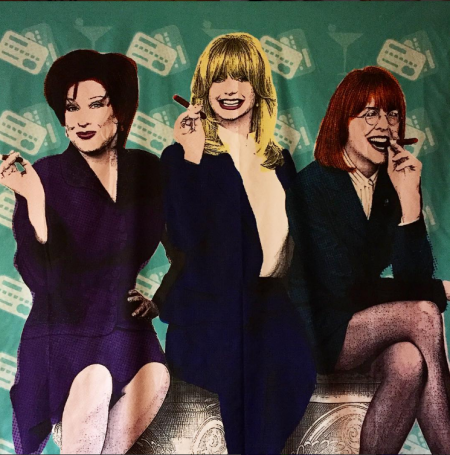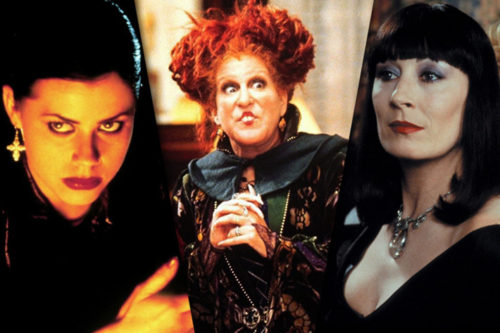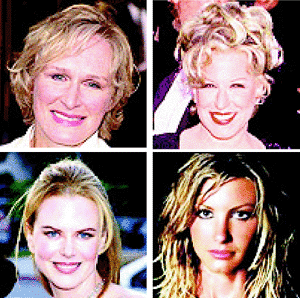Vulture
Vulture Asks: What Are the Best Revenge Movies?
By Vulture Editors
August 7, 2017
Perhaps you’ve just been betrayed by a friend, rejected by a lover, or unceremoniously fired by the leader of the free world on a global stage. Whatever the reason may be, we’re all occasionally in the mood for some good, old-fashioned vengeance at the movies, whether that comes in the form of gritty Korean thrillers, tales of petty high-schoolers plotting to upend the social hierarchy, or Bette Midler singing Lesley Gore in a white pantsuit.
In celebration of cinematic name-takers and receipt-keepers, Vulture has assembled a viewing guide to some of our favorite revenge movies in Hollywood history. Queue them up on a day when you just don’t have it in you to take the high road.
Oldboy (2003)
The hallway fight scene. The tongue excision. The live-octopus consumption. Incredibly taboo sexual themes. This modern vengeance classic has it all. (If you like what you see here, investigate the rest of Park Chan-wook’s Vengeance Trilogy, which rounds out with Sympathy for Mr. Vengeance and Lady Vengeance.) — Jordan Crucchiola
I Saw the Devil (2010)
When just one revenge climax won’t suffice, turn to this savage thriller from Korean director Kim Jee-woon. After a sadistic bus driver (Choi Min-sik) kills a motorist stranded in the snow, the victim’s secret-agent husband (Lee Byung-hun) dedicates his life to finding the murderer and making him pay. The twist of Devil is that the hero doesn’t just catch his prey once; he catches and releases him over and over again, prolonging the abuse. At two-and-a-half hours long, this movie is an endurance test for both its viewers and its subjects. — Jordan Crucchiola
Kill Bill Vol. 1 and Vol. 2 (2003 and 2004)
The first part has the Crazy 88 and an A-plus use of the Green Hornet theme, but the second has Uma Thurman’s Bride literally punching her way out of a grave. She’s not roaring and rampaging against anything but six feet of dirt, and we’d still argue it’s one of the most victorious revenge scenes in history. — Emily Yoshida
Inglourious Basterds (2009)
If, for some reason, you’re really in the mood to watch a bunch of fascists get their comeuppance. — Nate Jones
The First Wives Club (1996)
Vengeance in the movies doesn’t always have to include a bloodbath. Sometimes, vengeance looks like mature, adult women humiliating the exes who took them for granted and stole their youth. In First Wives Club, three old college friends (who happen to be played by legends Goldie Hawn, Bette Midler, and Diane Keaton) reunite when their fourth former bestie, trapped in a life of empty wealth and loneliness, kills herself by jumping off an Upper East Side terrace. Each encourages the others to strike back at their own lackluster ex-husbands in the name of all womankind. Remember: You. Don’t. Own. Me. — Jordan Crucchiola
Lady Snowblood (1973)
When someone wrongs you and you don’t have the tools to remedy the injustice yourself, just raise your offspring with the specific purpose of serving vengeance on your behalf. That’s the lesson of Lady Snowblood, Yuki Kashima (Meiko Kaji), and her blade of retribution. Yuki doesn’t choose to walk the road of most resistance — she was born specifically to do so: Her mother, gang-raped by the men who killed her husband, ends up in a women’s prison, where she seduces a guard to help her conceive a child who will one day become the instrument of her revenge on the men who ruined her life. Inspiring! — Jordan Crucchiola
The Count of Monte Cristo (1934)
Despite being set in the early 1800s, Monte Cristo is an evergreen story. After all, can’t a bad job or bad relationship or long-standing feud with a frenemy feel like you’ve been locked away in an island prison for 20 years, wasting away while all your loved ones believe you’re dead? If you have those very specific kind of blues, Edmond Dantès feels your pain — and he’ll motivate you to put your own long-con plans into place (no murdering, though). — Jordan Crucchiola
Revenge (1990)
In this early-’90s romantic thriller, Kevin Costner plays a recently retired U.S. Navy pilot who goes to visit a friend in Mexico and ends up having sex with his wife (Madeleine Stowe). There’s infidelity, violence, a crime kingpin, torture, imprisonment, and even a dead dog. (For some reason, the vengeance genre is the deadliest of all for canine companions.) — Jordan Crucchiola
Ms. 45 (1981)
On her way home from work one day, the shy, beautiful, and mute Thana (Zoë Tamerlis Lund) is raped twice, once in an alleyway and then once again almost immediately after getting home. She’s able to kill the second rapist, spurring a rapid transformation in Thana: girl goes from mild to full-on vigilante wild. After a lifetime of silent oppression, she takes to the streets looking for trouble — and for every man who would hit on, threaten, leer at, catcall, or otherwise look at her sideways. Now 36 years old, Ms. 45 feels scandalous and subversive even today. This is earned misandry, weaponized. — Jordan Crucchiola
The Handmaiden (2016)
There may be no auteur more skilled in the art of cinematic vengeance than Park Chan-wook. The Handmaiden tells the story of a young Korean girl (Kim Tae-ri) who goes to work in the service of a Japanese heiress (Kim Min-hee) with the intention of stealing her fortune out from under her. The scheming here has layers: The handmaiden is working under the thumb of a devious con man, and the heiress is living as a prisoner of her creepy, authoritarian uncle. The movie is told in three parts, each one pulling viewers further into the mystery and setting up truly startling reveals. — Jordan Crucchiola
13 Assassins (2010)
Takashi Miike’s dirty baker’s dozen set in the final days of feudal Japan has all you want from the prolific director: imaginatively gruesome violence, 1-on-100 fight scenes, and one-liners so tough you get the vapors. Nothing is cooler than Koji Yakusho unrolling a bloody scroll that reads “TOTAL MASSACRE,” before he and his dudes slice their way through the army of a murderous aristocrat. — Emily Yoshida
Jawbreaker (1999)
Chokers, spaghetti-strap tank tops, miniskirts, candy-colored everything, and exposed midriffs abound in this campy tale of murder and retaliation in snow-white suburbia. As queen mean girl Courtney, Rose McGowan turns in an all-time teen-villain performance, and the payoff moment in the finale truly is peachy fucking keen. — Jordan Crucchiola
The Equalizer (2014)
This is basically John Wick starring Denzel Washington, which means the protagonist is a stoic paternal figure with an almost divine sense of purpose: avenging the violent mistreatment of a young woman, played by Chloë Grace Moretz, at the hands of Russian gangsters. It actually came out the same year as Wick, but since it didn’t reinvent the revenge romp with breathtaking gun-fu, it didn’t get as much attention. Equalizer is more old-fashioned, with Washington defining his character in the tradition of Charles Bronson or Liam Neeson (or, as our chief film critic David Edelstein put it, he’s “Gandhi with a Glock”). — Jordan Crucchiola
Carrie (1976)
One of the greatest horror films of all time doubles as one of the most memorable revenge stories. At this suburban high school, nobody breaks a tiara into pieces so everyone can share it. There’s no adult with strong morals to step in and rescue Carrie (Sissy Spacek) from her bullies, or from her insane zealot of a mother (Piper Laurie). There’s just one increasingly uncontrollable, telekinetic girl who’s had enough of being put down. — Jordan Crucchiola
Let the Right One In (2008)
This Swedish supernatural thriller changed the face of screen vampires, and is arguably the key predecessor to today’s high-brow horror boom. At its core, Let the Right One In is a touching story about friendship between outsiders; who better to empower you to stand up to your bullies than the cute vampire girl next door? — Jordan Crucchiola
The Princess Bride (1987)
One of the most beloved films of its generation, The Princess Bride stars a giant (André the Giant), a dreaded pirate (Cary Elwes), rodents of unusual size, and Fred Savage — and has a timeless romance at its core. Most memorable, though, is its dialogue, including Mandy Patinkin’s classic, “My name is Inigo Montoya. You killed my father. Prepare to die.” Westley and Buttercup may be destiny’s children, but Inigo’s passion for justice rivals the intensity of their love. And did you catch the part where we said it’s Mandy Patinkin, playing a Spanish fencing master with long, wavy hair? (This is one of those gifts you don’t appreciate when you’re watching this at 11, but it really gives the movie new life as an adult.) — Jordan Crucchiola
Unforgiven (1992)
Is there a genre that lends itself to vengeance more readily than the Western? How about a Western directed by Clint Eastwood, a figure who has sought retribution onscreen for the past half century? This Academy Award winner for Best Picture was directed by and starred Eastwood as a reformed outlaw who agrees to take on one last dirty deed for a large bounty in order to save his family’s farm. Only one man’s five-o’clock shadow is up for this job. — Jordan Crucchiola
Memento (2000)
We’re pretty sure this is a revenge movie, but we can’t find the tattoo that tells us whom it’s necessary to seek vengeance against, or what they did. — Jordan Crucchiola
Mean Girls (2004)
How to take down the Plastics, in three steps: Target Aaron Samuels (the better half of the high school’s reigning power couple), plant a few Kalteen bars, and sow some major distrust in the so-called “army of skanks.” There are no fight scenes or bar brawls, but Mean Girls does include a deliciously vicious rendition of “Jingle Bell Rock.” Vengeance is sweet, and it’s also, like, 16 and has mathlete practice. — Hunter Harris
Get Carter (1971)
If the first thing you think of when you hear Michael Caine’s voice is dutiful house man Alfred from Christopher Nolan’s Batman movies, or something like The Cider House Rules, then do Mr. Caine’s legacy a favor and watch him avenge his brother’s death in Get Carter. — Jordan Crucchiola
Punisher: War Zone (2008)
This isn’t the new Punisher with Jon Bernthal, or the 1980s Punisher with Dolph Lundgren, or even the mid-2000s Punisher with Thomas Jane that tried unsuccessfully to start an anti-hero franchise right before big studios actually knew how to make great superhero movies. No, this is the otherPunisher, the one starring Ray Stevenson, that’s probably the closest road map for Marvel’s current incarnation of the character on Netflix. Stevenson was actually a good choice for the role, and War Zone was definitely a product of the Christopher Nolan School of Gritty Comics Adaptations (i.e., it includes Frank Castle saying, “Sometimes I’d like to get my hands on God”). — Jordan Crucchiola
Cape Fear (1962)
Max Cady doesn’t get enough credit for being one of the most disturbing movie villains of all time. This movie was terrifying both times it was made, but we will refer you to the original, starring Robert Mitchum as a convicted rapist who gets out of prison after eight years, then conspires to track down and ruin the life of the lawyer who got him sent to jail (Gregory Peck). If you have time for a double feature, check out the Scorsese remake from 1991, starring Robert De Niro as Cady. — Jordan Crucchiola
Straw Dogs (1971)
This drama from Sam Peckinpah was part of a wave of highly violent cinema that surged in the early 1970s (think A Clockwork Orange and The Godfather). Straw Dogs was especially controversial for its brutal climactic scene and depiction of rape. It’s easy to exact revenge in movies with guns, but Dogs rolls out the boiling oil, fire irons, and bear traps. Dustin Hoffman has rarely been so vicious. — Jordan Crucchiola
Star Trek II: The Wrath of Khan (1982)
“Khaaaaaaaaaan!” — Jordan Crucchiola
Blue Ruin (2013)
Most revenge movies conclude with the desired act of vengeance, or at least something close to it. Not Jeremy Saulnier’s Blue Ruin, which understands that revenge is often part of a larger, more enduring cycle; vengeance itself will have to be avenged. And this rarely works out well for anyone. — Kevin Lincoln
The Night of the Hunter (1955)
One of the great parables about religion — and, in particular, about those men of the cloth who loom so large in the American spiritual psyche — Charles Laughton and James Agee’s The Night of the Hunter ends with a revelation, one that necessitates an attempt at revenge by the misled flock. But, as the movie goes to great pains to point out, no man or men can take the place of God — or nature, or fate, or however you prefer to view the larger forces at work in this world. Whether it comes at the hands of a mob or the executioner doesn’t matter. — Kevin Lincoln
Legally Blonde (2001)
Who can forget the moment when Reese Witherspoon’s Elle Woods is awarded her a spot as Victor Garber’s law intern?
It’s half war cry, half mantra: Legally Blonde starts out as a movie about a woman trying to win back a boneheaded ex, but turns into a nicely packaged revenge fantasy, wherein women reclaim the accomplishments that are rightfully theirs. With bends and snaps instead of bullets, it’s sisters doin’ it for themselves. — Hunter Harris
Mad Max: Fury Road (2015)
George Miller’s chrome-and-blood-soaked masterpiece is, essentially, one big chase scene, meaning its conclusion is even more hard-earned, visceral, and satisfying than your standard revenge film. As Vulture’s film critic David Edelstein wrote, “You don’t just watch it, you rock out to it.” Its triumphant overthrowing of the patriarchy feels particularly poignant and necessary now. — Ethan Sapienza
The Virgin Spring (1960)
Leave it to the maestro, Ingmar Bergman, to illustrate the emotional calculus of revenge in one perfect, crystalline image: Max von Sydow, maybe Bergman’s greatest instrument, trying to rip a tree out of the ground after the rape and murder of his daughter. It’s the kind of senseless animal rage that tends to exist in the real world, not cinema, but Bergman is willing to look straight on at the ineffable. When the act of revenge ultimately follows, it’s been so undermined by the pathos and despair of this moment that we know, just as well as von Sydow does, how empty and hollow it is. This might sound super depressing, but you don’t become one of the greatest filmmakers of all time by making things easy. — Kevin Lincoln
The Revenant (2015)
The Revenant is more than a mere tale of vengeance; it’s an epic story of resurrection. As Hugh Glass, Leonardo DiCaprio digs himself out of a snowy grave to cross the American frontier and kill the man who put him in the ground. Are you even serious about revenge if you’re not willing to sleep inside the carcass of a freshly dead horse to stave off freezing to death? Check your priorities. — Jordan Crucchiola
Ex Machina (2014)
When humans invent machines that are stronger, smarter, and more resilient than us in every way, it almost never works out well. (See: Skynet.) So what happens when a man with a massive God complex makes a superior machine-being, imbues it with an awareness of emotional processing and sexuality, and tries to keep it locked in a glass prison? Oscar Isaac doing the best onscreen dancing you’ll find in any movie, ever, is one thing that happens — and the machine outfoxing its creator is another. — Jordan Crucchiola
The Great Silence (1968)
When was the last time you brushed up on your French–Italian spaghetti Western co-productions? Here’s an opportunity: Jean-Louis Trintignant plays a gunslinger who goes by the name of Silence (because a pair of bounty hunters killed his parents and cut his throat when he was younger) and is contracted by a woman to kill the gang leader who murdered her husband. It’s the best film by director Sergio Corbucci, and in the conversation for best Western of all time. If you can find a copy with the original ending, even better. — Jordan Crucchiola
Point Blank (1967)
There’s something special about revenge movies in which the hero is left for dead, but then rises to bring down holy hell on his or her assailant. In this crime noir from director John Boorman, a man named Walker (Lee Marvin) is double-crossed by his literal partner in crime, Reese (John Vernon), who shoots him down on Alcatraz, steals his money, and makes off with his wife, too. Once Walker is back from the dead, he not only has Reese to contend with, but a whole organized crime ring. Sounds like he’d have a lot to talk about with John Wick. — Jordan Crucchiola
Hard Candy (2005)
Before Ellen Page was Kitty Pride or Juno, she was Hayley Stark, a vigilante teenager baiting potential pedophiles with the intention of raining harsh justice down upon them. Hard Candy also marks Patrick Wilson’s first film after Phantom of the Opera, and just his fourth feature credit overall, meaning Page was much more of a Hollywood veteran at this point — and it remains her most disarming role to date. The film’s supersaturated tones add intensity to the steady manipulation and torture that Hayley exacts on her mark, making the whole experience more stressful as you consider the “did he or didn’t he?” question hovering over the typically dreamy Wilson. — Jordan Crucchiola







